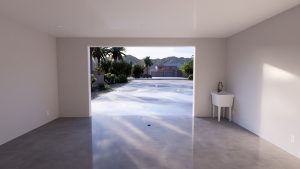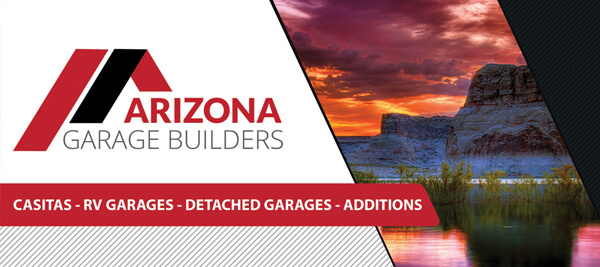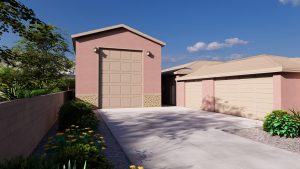
When constructing a garage, choosing the right type of wall system is crucial for the durability, functionality, and overall performance of the structure. Two common options for garage walls are concrete blocks and poured concrete. Each method has its own set of advantages and disadvantages, and the choice often depends on your specific needs, budget, and the local building conditions. At Arizona Garage Builders, we aim to help you make an informed decision by breaking down the pros and cons of using concrete blocks versus poured concrete walls.
Concrete Block Walls
Pros:
1. Cost-Effective:
-Lower Material Costs: Concrete blocks are generally more affordable than poured concrete, making them an economical choice for budget-conscious projects.
-Labor Costs: Building with blocks can be more labor-intensive, but for smaller projects, this might still be more cost-effective than pouring concrete.
2. Design Flexibility:
-Versatility: Concrete blocks offer flexibility in design, allowing for more creative architectural features such as curves, angles, and varying wall thicknesses.
-Aesthetic Appeal: Blocks can be used to create different textures and patterns, which can add visual interest to your garage.
3. Ease of Installation:
-Accessibility: Blocks are easier to transport and handle on-site, especially in areas where large equipment access is limited.
-Modular Construction: The modular nature of concrete blocks makes them easier to work with for smaller, more intricate builds.
4. Thermal Insulation:
-Energy Efficiency: Concrete blocks naturally offer some level of thermal mass, which can help with insulation, especially when combined with additional insulating materials.
Cons:
1. Structural Strength:
-Lower Overall Strength: Concrete blocks may not be as strong as poured concrete in resisting heavy loads or extreme forces, making them less suitable for certain structural applications.
-Potential for Weak Points: The mortar joints between blocks can be weak points that might compromise the wall’s overall integrity over time.
2. Moisture Penetration:
-Higher Porosity: Concrete blocks are more porous than poured concrete, which means they can absorb water and potentially lead to moisture issues if not properly sealed.
-Maintenance Requirements: To prevent moisture penetration, concrete block walls require regular maintenance, including sealing and waterproofing.
3. Labor Intensive:
-Time-Consuming: Building with concrete blocks can be more labor-intensive and time-consuming, especially for larger structures, leading to longer construction times.
Poured Concrete Walls
Pros:
1. Superior Strength:
-Structural Integrity: Poured concrete walls are significantly stronger than concrete blocks, offering better resistance to pressure, impacts, and natural forces like earthquakes.
-Monolithic Construction: Because poured concrete is continuous, it creates a monolithic structure that is free of joints, making it highly resistant to cracking and shifting.
2. Moisture Resistance:
-Low Porosity: Poured concrete is less porous than concrete blocks, making it more resistant to water infiltration. This helps prevent moisture-related issues like mold, mildew, and structural damage.
-Durability: The solid nature of poured concrete walls makes them highly durable and low-maintenance, reducing the need for frequent repairs.
3. Energy Efficiency:
-Thermal Mass: Poured concrete provides excellent thermal mass, helping to regulate temperature fluctuations and improve energy efficiency.
-Insulation Compatibility: Poured concrete walls can easily be combined with insulation systems to create highly energy-efficient structures.
4. Faster Construction:
-Quick Installation: Once the forms are set up, pouring concrete is a relatively quick process, which can speed up the overall construction timeline for your garage.
-Less Labor-Intensive: While the setup requires skill, the actual pouring process involves less manual labor compared to laying concrete blocks.
Cons:
1. Higher Cost:
-Material Costs: Poured concrete walls tend to be more expensive than concrete block walls, both in terms of materials and the need for specialized labor and equipment.
-Formwork Expense: The cost of formwork, which is essential for pouring concrete, adds to the overall expense of the project.
2. Complex Installation:
-Site Preparation: Pouring concrete requires careful site preparation, including the construction of forms and the need for heavy equipment, which can be challenging in tight spaces.
-Weather Dependence: The pouring process can be affected by weather conditions, such as extreme temperatures or rain, which can delay the project.
3. Less Design Flexibility:
-Limited Aesthetics: Poured concrete walls tend to be more uniform in appearance, offering fewer opportunities for creative design compared to concrete blocks.
4. Repair Difficulty:
-Complex Repairs: If a poured concrete wall develops cracks or other issues, repairs can be more complex and costly than with block walls.
Final Thoughts
Both concrete block and poured concrete walls have their merits, and the choice between them depends on factors like budget, desired strength, and the specific requirements of your garage project. At Arizona Garage Builders, we are committed to using high-quality materials and construction methods tailored to your needs. Whether you’re building a custom garage, an RV garage, or a detached garage, our team will help you choose the best wall system to ensure that your garage is both durable and functional.
Contact us today to discuss your project and learn more about how we can help you build a garage that stands the test of time.


Get A Quote For Your New Garage
We prepare your estimate for your new construction project with absolutely no obligation or cost. We prepare all of the calculations and 3d renderings for your project so you know what Arizona Garage Builders can do for you. We will prepare your proposal online so you can see it from any device..



